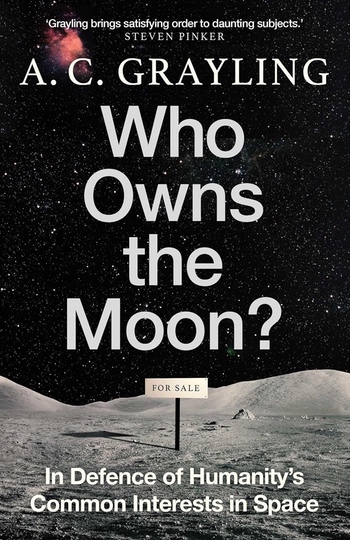Review: Who Owns the Moon?by Jeff Foust
|
| The Outer Space Treaty of 1967 has frequently been described as the foundation of international space law, but some wonder if that foundation needs to be shored up or replaced. |
Russia and China countered with an amendment that would expand the scope to all weapons, similar to treaties they have proposed for decades that the United States and many other Western nations have opposed on grounds that it is unverifiable and excludes terrestrial ASATs. That amendment failed, and in the final vote on the resolution, 13 nations voted yes and China abstained. Russia, though, voted no, exercising its veto to kill the resolution. “Regrettably, one permanent member decided to silence the critical message we wanted to send to the present and future people of the world: outer space must remain a domain of peace, free of weapons of mass destruction, including nuclear weapons,” Kazuyuki Yamazaki, Japan’s ambassador to the UN, said after the vote.
The Outer Space Treaty of 1967 has frequently been described as the foundation of international space law, but in recent years, given the growth in the number of types of space actors, some have wondered if that foundation needs to be shored up or replaced. One of the latest treatises on the topic is Who Owns the Moon? by A. C. Grayling, a professor of philosophy at Northeastern University – London, where he argues that the treaty is outdated but fails to offer a solution.
Grayling is concerned about the twin forces of commercialization and militarization as space activity grows. The former could lead, he fears, to a “gold rush” for resources on the Moon or elsewhere in what he argues is a largely unregulated “Wild West” environment. (That may be a surprise for companies who complain today about the level of paperwork and bureaucracy they have to deal with just to launch satellites.) That land grab for resources brings with it the threat of conflict enhanced by growing militarization of space, he states. He likens that in one chapter to the “Scramble for Africa” by European colonial powers in the late 19th century, where they swiftly divided up the content and its resources.
The Outer Space Treaty is too vague to be useful today, he concludes, thus “revisiting the Outer Space Treaty well in advance of problems arising from its terminology is desirable. That means now.” (Emphasis in original.) He compares it to two other treaties dealing with global commons, the Antarctic Treaty and the High Seas Treaty that emerged from the decades-long Law of the Sea efforts.
Grayling is particularly enamored with the Antarctic Treaty, seeing it as an example of an “enduring and successful” international agreement that protected the continent. It has kept the continent free of conflict and environmental damage, he argues, and none of its signatories have sought to use a provision available since 1991 to reopen the treaty for modification.
| “We don’t live in treaty times any more,” Aarti Holla-Maini, director of the UN Office for Outer Space Affairs, said. “It is not realistic and it is also not what we need.” |
It's not clear, though, that the Antarctic Treaty offers much in the ways of lessons for space. It has never been seriously tested because Antarctica never carried major strategic value to the Cold War superpowers and because of the lack of economically viable natural resources. How well would the treaty work if someone found tomorrow a vast, accessible deposit of petroleum or rare earth elements? China, he acknowledges, is already pushing the bounds of the treaty by seeking control of 20,000 square kilometers of territory around its Kunlun base there.
He states early in this slender book—the main text is only a little more than 100 pages, excluding appendices—that given those issues “the case for revising the Outer Space Treaty sooner rather than later makes itself.” He clearly believes that to be true, because he makes little effort to make that case, in particular how the treaty should be revised: what sections and in what manner. His arguments become as vague as he claims the language of the treaty is.
Notably, he says little about ongoing effort to build upon the Outer Space Treaty through non-binding approaches, like the development of norms and other documents, which lack the legal standing of a treaty but can be developed among like-minded nations far more quickly. An example is the Artemis Accords, now signed by nearly 40 nations, that its advocates say is intended to “operationalize” the Outer Space Treaty by adding detail to key provisions while also addressing additional topics, like use of space resources. Grayling mentions the Artemis Accords in passing but seems oddly incurious about them, spending no time evaluating the document’s contents or effectiveness.
Revising or replacing the Outer Space Treaty seems like a bridge too far in the current climate. “We don’t live in treaty times any more,” Aarti Holla-Maini, director of the UN Office for Outer Space Affairs, said during a session of the 39th Space Symposium earlier this month. “It is not realistic and it is also not what we need.” A better book, then, might be to find ways to improve the current international space law through norms and similar agreements rather than dreaming of a new treaty.
Note: we are now moderating comments. There will be a delay in posting comments and no guarantee that all submitted comments will be posted.
